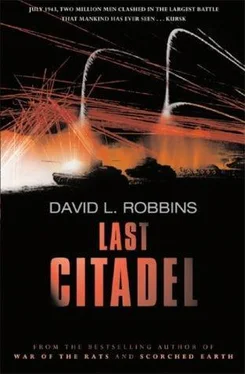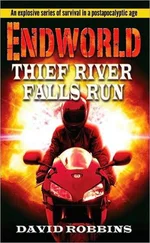‘We can take Prokhorovka,’ he said. ‘Did you know I used to be a bullfighter?’
Balthasar showed nothing of the disdain the Nordic peoples held for the barbarism of bullfighting. The gunner was still a very young man, he’d likely never been far from his own town in Germany before the war swept him up, never known a Spaniard. Balthasar probably thought all Spaniards were bullfighters.
‘No, sir.’
‘I can read what a bull is thinking. I can tell which way he’s going to jump. My father taught me this. Having my life depend on it taught me, too. And I can tell you, Balthasar, about the Russians. I can read them. We can beat them. They know it. All their attacks are from the flanks. They’re afraid to come right at us. They nibble at our sides. Every one of their direct assaults has been weak. They’re defensive. We’ve bled them, Balthasar, we’ve bled them almost to where they’ll fall. We’ve got to go forward. We’ve got to push the blade in deeper.’
Luis and Balthasar looked west, at the depth the blade was already into the Russian heart. It was not enough.
‘Tomorrow,’ Luis promised.
This sun over the conquered western corridor went down in the time of Luis’s mind and came back up tomorrow, glowing red in the east, chasing stars, beginning the end. And there it was again, the partisan’s heart beating in his hand. And there were bulls’ hearts throbbing there, too. But the sensation was different, not only the pump of one man’s stolen heart and the ended lives of animals but the pulse of all Russia, right in Luis’s fist. He held his hand up, cupped as though holding a real heart, and looked into his curled palm.
‘Tomorrow,’ he said again, ‘we’ll take Prokhorovka.’
July 12
0410 hours
with the 32nd Tank Brigade
2 kilometers west of Prokhorovka
The commissars surfaced at first light. They came with bottles of vodka.
The cartons in their grips rang with knocking glass. The boxes sounded to Dimitri like the bells of fishermen on the Black Sea, when the boats came home from a day’s haul and called all to the docks who wanted to buy fresh catch. The commissars spread out among the tank brigade, ringing the men awake in the charcoal morning. They wore the same mustard uniforms as infantrymen, but with many medals and ribbons pinned to their tunics, and with only a sidearm slapped on their belts. The politrooks set the cardboard cartons down at their feet. They began their own calls, fishermen themselves, baiting with the vodka.
Dimitri had been awake for hours, watching lightning ripple over the steppe. He’d listened to the night workers out on the battlefield, to the thumps of explosives as engineers blew up disabled T-34s too damaged to be towed away and repaired. Sappers crawled to the front to lay mines where German tanks were certain to come today. From the other direction came the logistics corps bringing up food and ammo, lubricants and diesel. Dimitri eyed the laden commissars, he was the first to traipse to the nearest one. He leaned down to take a bottle by the neck out of the box. The bottle was corked by a bit of rag.
‘Courage!’ the commissar bellowed at Dimitri, as though the two were on opposite sides of a field. Dimitri held the bottle up by the neck like a chicken for dinner.
‘Courage,’ he echoed and walked off.
Sasha appeared from somewhere in the night – Dimitri stayed close only to his tank, casting his senses out to the battlefield, to the dark sunflower field on the valley floor – and slid down beside him. The boy was freckled and orange-cast and wrapped white, grinning bravely through his pain. Dimitri handed the warm glass over. The two sat listening to the keening commissar.
A crowd of the tankers gathered around the man, perhaps a hundred. They came for the bottles and stayed in the commissar’s net. None of these boys had been in the fight for Kursk yet, Dimitri could see it on them. They were frightened and needy of the commissar’s calls for bravado, they did not know yet what they would do today. Great things, the commissar told them, great things, and Dimitri knew this to be true, because living through today or dying in these flowers and grainfields would be remembered as great.
Dimitri and Sasha shared the bottle, neither speaking when the commissar called into the center of his gathered ring the young lieutenant from 3rd Mechanized Corps and the battle for the Oboyan road, the commander of the tank General Platov . The Germans were stopped on the road to Oboyan and they would not pass to Prokhorovka, the Lieutenant told them. He was cheered with Urrabs , clapping, and lifted bottles. Thick Pasha was one of the applauders, his coveralls dirtier than any of the others standing around him.
Valentin reached into his breast pocket for a folded sheet of paper. This was something official, a communiqué from headquarters. A new duty, Dimitri thought. Splendid. We don’t have enough to do today.
‘We will face a powerful German force today,’ Valya announced, rattling the page as if the paper meant something that could equal a man’s life. ‘We have orders not to budge away from the Prokhorovka road. There will be no retreat today. There will be only victory.’
The men cheered again. They don’t know, Dimitri thought, and turned to see the same high spirits on Sasha’s tired face. The cheers put a mad taste in his mouth and he sipped more vodka to wash it away. Valentin let the tankers roar their approval that they should die today. Dimitri paid little attention, hearing nothing new from the mouth of a Soviet.
Valya told them what was on the sheet, what they would be facing today: three highly trained and veteran SS divisions. These were men and weapons diverted from the assault on the Oboyan road where they could not break through. Now they would try the way through Prokhorovka. They will have with them fifty-seven assault guns and two hundred and thirty-six tanks. Ninety-one of the tanks will be Mark IVs, and fifteen will be Mark VI Tigers.
Where did the Red Army get these facts and figures, Dimitri marveled, how could they be this exact? He hoisted his bottle and tapped the lip of it to an invisible drinking partner, toasting whoever was responsible for this kind of precision. That’s why we’re here, he thought, the Soviets have lined up every tank and gun they could scrounge in front of the damn SS. That kind of information was worth its weight in gold. Not that it will save any lives, but it was damn impressive.
Valya described the size and power of the Tiger tank. Red Army Headquarters had determined that a priority target for the battle of Prokhorovka was the Mark VI Tigers. Every Soviet tank was to find and wipe out every Tiger they could. Valentin reminded the men of their training, to approach the Mark VI from the sides, to attack it with numbers in your favor, to aim for the treads first to disable the mammoth, then move in for the kill.
Valentin pocketed the paper. This brought the commissar back to his side. Another, final round of urrahs rang from the crowd for the young hero of Oboyan, and soon, of Prokhorovka.
He was in his driver’s seat when the first German fighters swooped past. His head ached a little from the dawn vodka. The day grew fat with humidity and he sat swiping beads from his forehead, slinging them off his fingers out his open hatch. When he saw the first black blurs his hand froze, as though waving hello to them.
One flight of three fighters roared by wing-to-wing without firing a round, then were followed by another flight. The planes dove in low formation, then carved away into sharp banks. They were remarkably swift, beautiful even. Dimitri shook his headache at war in the sky; when he was a boy the skies were blue and black and gray, they were birds and constellations and mansions of cloud and the place where God lived. But never again would children know that kind of sky, war was in it now, and war was out on the ocean, too, and under the water, and one day it will be in the stars, he knew. Wherever men go, we’ll take death with us. Dimitri thought of Katya and imagined her a star pilot flying a machine he could not envision. A rocket, perhaps, free and fast like she always was.
Читать дальше












